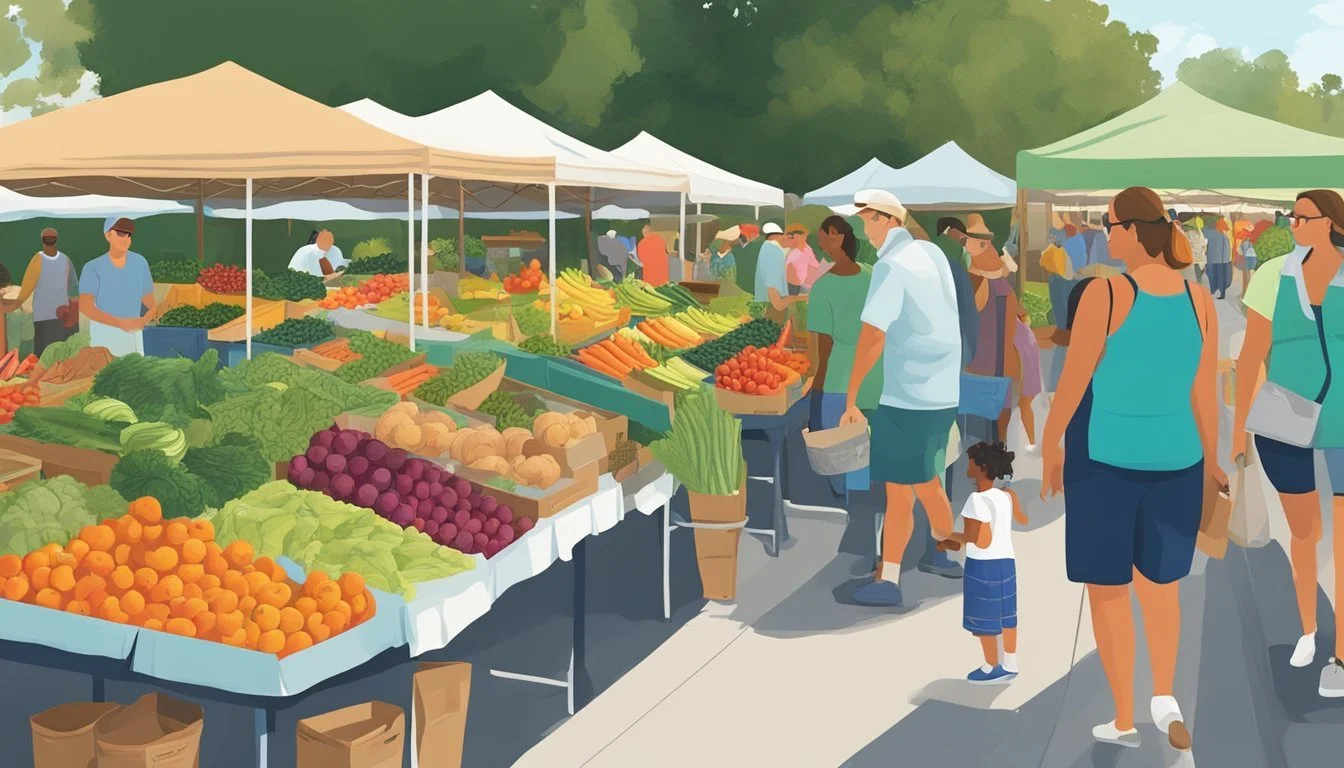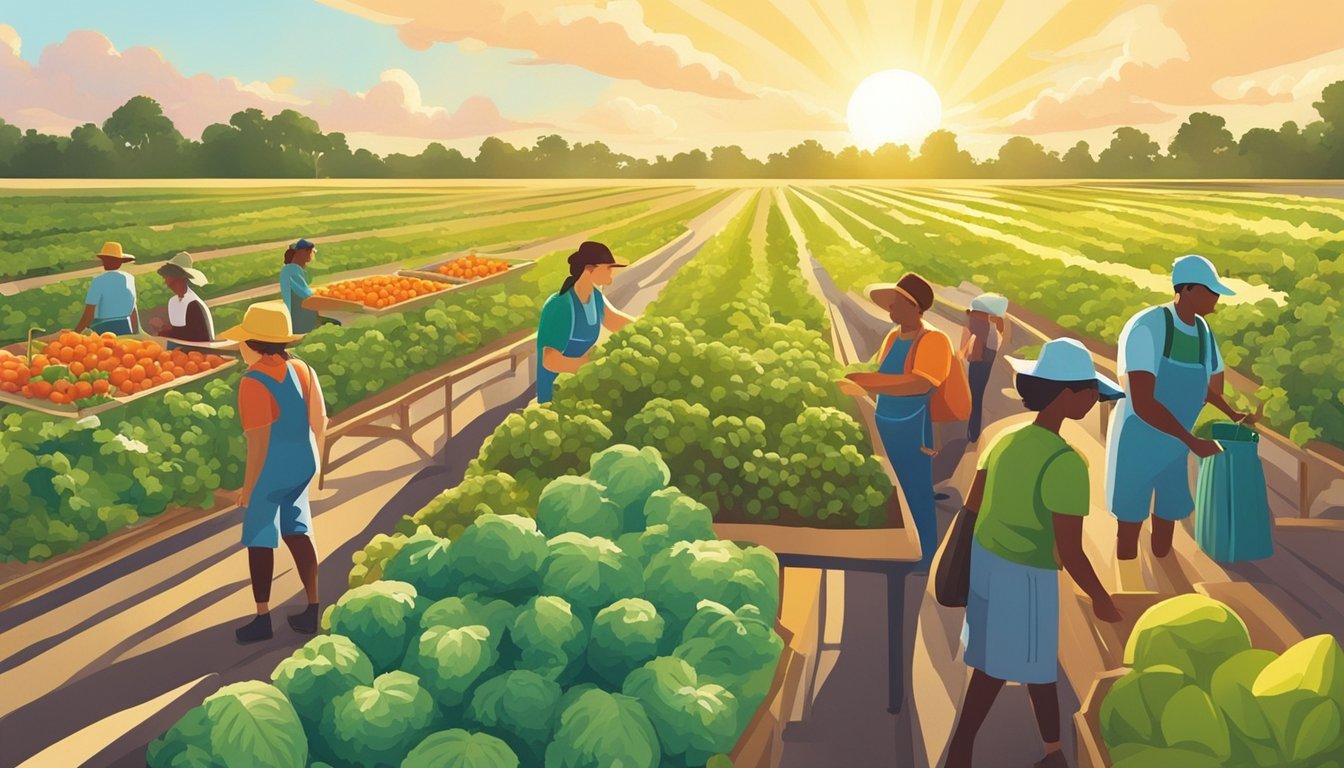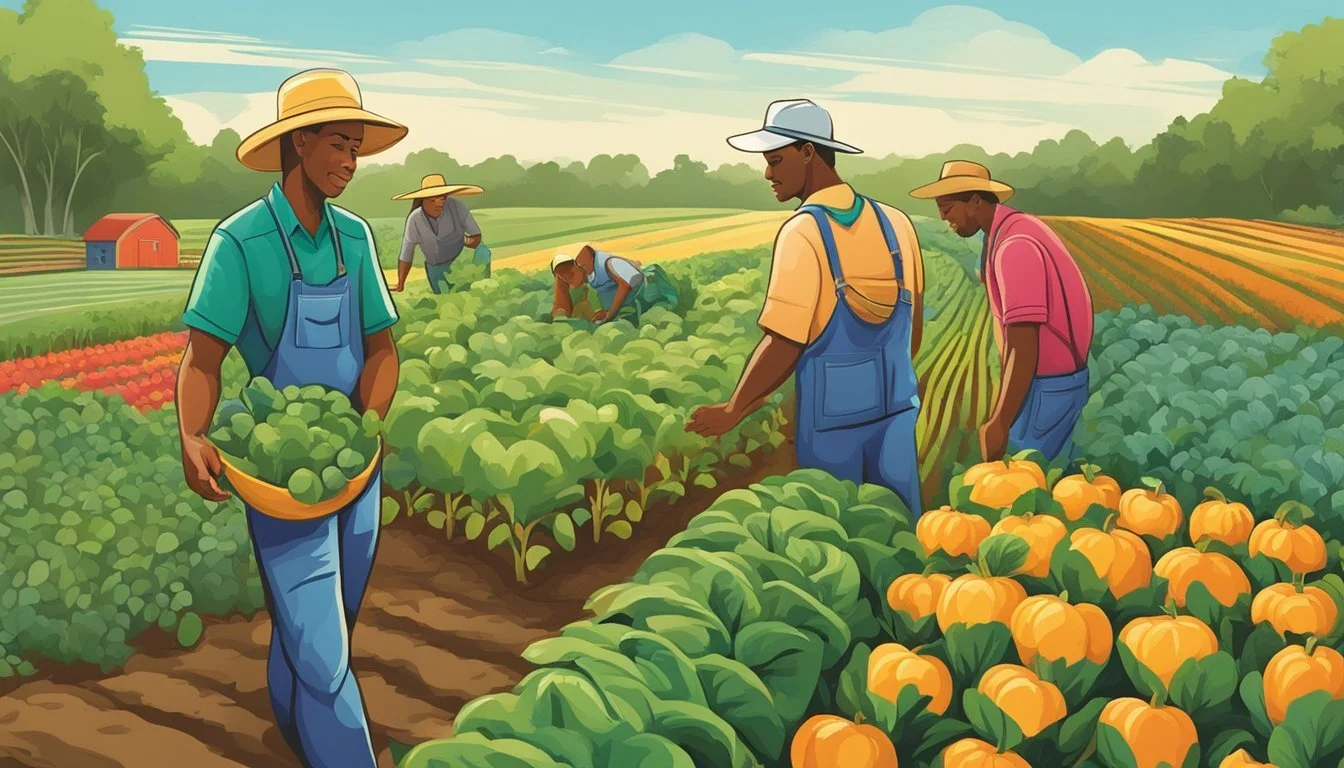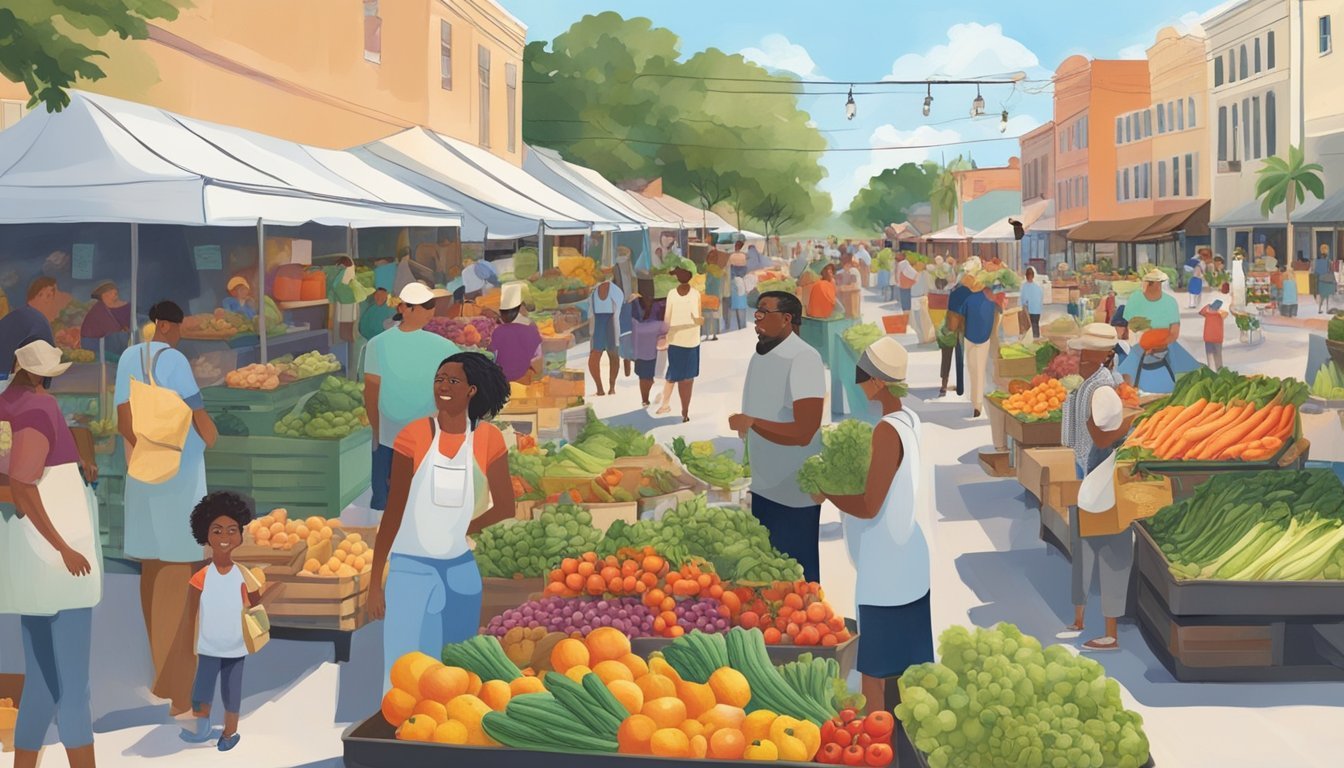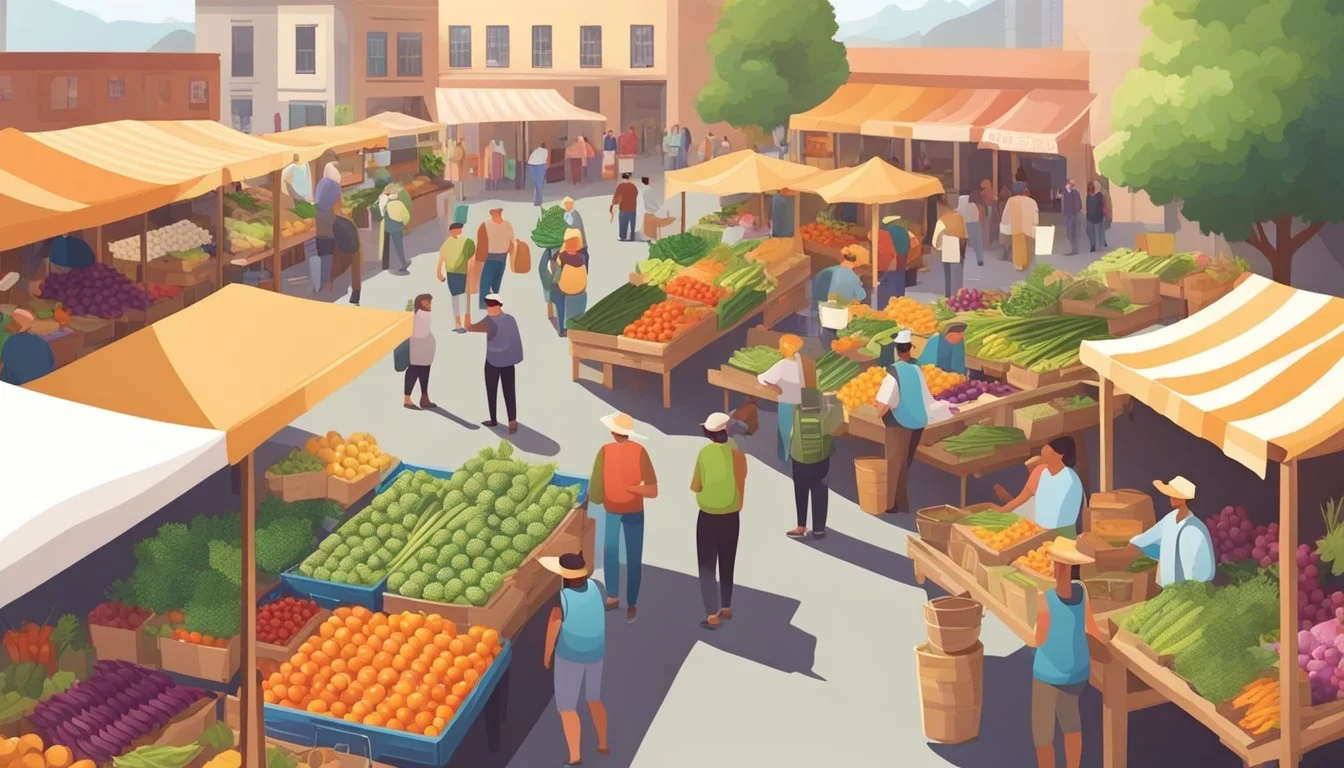Community Supported Agriculture (CSA) in St. Petersburg, FL
A Guide to Local Produce and Farms
Community Supported Agriculture (CSA) has taken root in St. Petersburg, Florida, as an innovative food distribution model that encourages a partnership between local farmers and community members. This system allows consumers in St. Petersburg to subscribe to the harvest of a local farm or network of farms, receiving regular shares of fresh, local produce and other farm products. CSA members enjoy seasonal goods by purchasing a membership or "share" in the farm's yield, usually provided on a weekly basis throughout the farming season.
The emergence of CSAs in St. Petersburg has played a significant role in supporting local agriculture and fostering a closer connection between residents and the food they consume. These programs not only provide a stable market for local farmers but also enable consumers to participate directly in the act of farming by sharing the risks and rewards of the agricultural process. Florida's ample sunshine and growing season work favorably for a range of local CSA options, offering St. Petersburg residents access to fresh, organically grown fruits, vegetables, and other products like goat milk and microgreens, contributing to a more sustainable and traceable food system.
What Is Community Supported Agriculture (CSA)?
Community Supported Agriculture, commonly known as CSA, represents an innovative relationship between local farmers and consumers, emphasizing direct and sustainable access to organic vegetables and fruits.
The CSA Model
In a CSA, members purchase shares of a farm's anticipated harvest upfront. This financial model provides farmers with the necessary funds for the season's operations and, in return, consumers receive a portion of the farm's output throughout the growing season. The typical setup involves:
Pre-paid shares: Members pay at the start of the season, which aids in the farm's initial production costs.
Regular distribution: Shares of the farm's produce are delivered weekly or bi-weekly to the consumer.
Seasonal variety: Members enjoy an assortment of items that change with the season, such as vegetables, fruits, and sometimes additional farm products.
Benefits of Joining a CSA
Joining a CSA offers numerous advantages to consumers:
Freshness: Produce is locally sourced and often harvested close to delivery times.
Support for Local Agriculture: Consumers directly support farmers and contribute to the local economy.
Sustainable Practices: Many CSAs follow organic and environmentally friendly farming methods.
Health: Members consume a diverse range of organic produce, fostering a healthier diet.
By opting for CSA, individuals not only engage with a model that champions sustainability but also involve themselves in a system that bolsters the vitality of the local agricultural community.
CSA Farms in St. Petersburg
CSA farms in St. Petersburg offer residents a chance to connect with their food sources by subscribing to the harvest of various local and often family-owned farms. These farms typically follow organic standards delivering fresh produce directly to the community.
Full Circle Farm
Full Circle Farm provides CSA memberships where consumers can receive shares of fresh, locally grown produce. They focus on sustainable farming practices and often offer educational programs to promote understanding of organic agriculture.
Emmanuel J Roux Urban Farm
Located within the city, Emmanuel J Roux Urban Farm operates as an urban farm that is deeply integrated with the community. They combine local farming with opportunities for city dwellers to experience and learn about agricultural processes.
Geraldson Community Farm
Situated in Northwest Bradenton, close to St. Petersburg, Geraldson Community Farm is known for its adherence to USDA certified organic practices. This farm offers a variety of organic produce through its CSA program, and it conducts tours to showcase its methods.
Little Pond Farm
As a family-owned farm, Little Pond Farm takes pride in offering CSA shares that provide a weekly selection of fresh and organic vegetables. They are committed to maintaining high organic standards and introducing innovative sustainable farming techniques.
Gateway Organic Farm
Gateway Organic Farm, one of the pioneering organic farms in the region, operates under the principles of family-owned and sustainable agriculture. They are reputed for their quality produce and their dedication to maintaining USDA certified organic certification.
Organic Practices and Certifications
In St. Petersburg, Florida, Community Supported Agriculture (CSA) programs emphasize the role of organic practices and certifications in providing nutrient-dense, chemical-free produce. These key components ensure that food safety and environmental stewardship are at the forefront of the local agricultural model.
Importance of Organic in CSA
Organic farming methods are integral to CSA operations, as they prioritize the health of consumers and the planet. CSA farmers focus on growing a variety of herbs and vegetables without the use of harmful chemicals. By doing so, they foster biodiversity and soil health, leading to produce that is rich in nutrients. Consumers can directly support certified organic farms and benefit from fresh, organic produce that is cultivated with a commitment to sustainable agriculture.
Understanding USDA Certification
To become USDA certified organic, a CSA farm must comply with federal guidelines that include:
Prohibition of synthetic fertilizers and certain pesticides.
Use of crop rotation and other natural methods for soil fertility.
Maintenance of strict separation from non-organic products.
This process ensures that the farm adheres to a rigorous standard for organic production. When a farm is USDA certified organic, consumers have assurance that the food they are receiving is grown according to established organic principles and is subject to regular inspections.
Alternative Farming Techniques
In St. Petersburg, Florida, CSA farms are integrating alternative farming techniques that emphasize sustainability and efficiency. These innovative practices cater to urban settings and facilitate pesticide-free produce, highlighting concepts like aquaponics and hydroponics, which are suitable for areas with limited soil availability.
Aquaponics in CSA
Aquaponics combines aquaculture (raising fish) with hydroponics (cultivating plants in water) in a symbiotic environment. In aquaponics systems, fish waste provides an organic nutrient source for the plants, and the plants help to filter and clean the water, which is then recirculated back to the fish tanks. This closed-loop system maximizes water efficiency and produces both plants and fish for the community.
Pros:
Water-efficient
Pesticide-free
Dual production of fish and plants
Cons:
Initial setup cost
Requires careful monitoring
Hydroponic Systems and CSA
Hydroponic systems allow plants to grow in a nutrient-rich solution, using inert media like perlite and coconut fiber, rather than soil. These systems can be far more water-efficient than traditional farming and can yield a higher production volume as nutrients are delivered directly to the plant roots. CSA farms in St. Petersburg applying hydroponic methods often emphasize their pesticide-free commitment and offer home delivery of these fresh, local microgreens and vegetables.
Hydroponic Media:
Perlite: Lightweight, improves aeration
Coconut Fiber: Sustainable, retains moisture
Innovative Urban Farm Solutions
Urban farms in areas like St. Petersburg have developed innovative solutions to maximize limited space and provide fresh produce to the community. These urban microgreens farms take advantage of vertical farming techniques, stacking plants in layers to increase yield per square foot. By employing soilless systems or raised beds with a blend of perlite and coconut fiber, they ensure the efficient use of space and resources. These CSA farms often operate with a vision of an "urban paradise," offering home delivery of fresh, pesticide-free produce directly to the consumer's door.
Urban Farm Features:
Space-efficient vertical farming
Soilless growing mediums
Emphasis on local, pesticide-free produce
Direct-to-consumer home delivery options
Community Impact and Membership
The introduction of Community Supported Agriculture (CSA) to St. Petersburg, FL, has created a robust network of mutual support between local consumers and farmers. This model ensures a stable market for growers while granting members access to fresh, seasonal produce.
Supporting Local Farms
Local farms in St. Petersburg benefit significantly from CSA programs. Through memberships, farmers receive financial support at the start of the growing season, which can help cover the initial costs of planting and cultivation. Examples of local farms engaged in CSA include Rebecca's Veggie Patch, which employs innovative stacker boxes and organic growing media. By forging a connection with consumers, these growers:
Ensure consistent demand for their crops
Minimize waste by growing to meet specific membership numbers
Receive better prices for their produce, as there is no middleman
Strengthen their farming practices with a commitment to sustainability
Becoming a CSA Member
Individuals can become CSA members typically by purchasing a share of the season's harvest. In return, they receive a box of vegetables or other farm products periodically throughout the farming season. Memberships often range between $400-$700 annually, depending on the offerings and farm. Steps to become a member usually involve:
Researching local farms or organizations involved in CSA.
Selecting a share that suits individual or family needs.
Committing financially upfront, often with flexible payment options.
Picking up the produce at designated locations, or in some cases, receiving home deliveries.
By joining a CSA, members directly support local agriculture and become part of a larger community that values fresh, locally grown food and the overall health of the local economy.
Direct-to-Consumer Options
St. Petersburg's residents can enjoy fresh, local produce through direct-to-consumer options like CSA box subscriptions and tailored delivery services to homes and restaurants. These alternatives provide an opportunity for consumers to support the local agricultural community and enjoy products that are fresh from the farm.
CSA Box Subscription
Community Supported Agriculture (CSA) in St. Petersburg offers weekly CSA boxes that allow individuals to subscribe and receive a variety of fresh seasonal produce, and in some cases, specialty cut flowers. The subscription typically operates on a seasonal basis where consumers can pick up their weekly shares at predetermined locations, including local farmers' markets such as the Saturday Morning Market.
Pickup Locations: Multiple, including Saturday Morning Market
Frequency: Weekly
Contents: Seasonal produce, potential inclusion of specialty items like cut flowers
Restaurant and Home Deliveries
Restaurants in St. Petersburg looking to include local ingredients in their menus can partner with CSAs for direct deliveries, thereby supporting community agriculture and enhancing their culinary offerings with fresh ingredients. For residential consumers, home delivery services provide the convenience of receiving farm-fresh items directly at their doorsteps, ensuring access to nutritious food with minimal effort.
Service Options: Home delivery, Restaurant delivery
Delivery Days: Varies by provider
Product Range: Diversified produce, Cut flowers (specialty providers)
Educational Opportunities and Events
In St. Petersburg, FL, Community Supported Agriculture (CSA) presents unique educational opportunities through various events. These occasions provide participants with practical knowledge about sustainable farming and local food production.
Farm Tours and Workshops
CSAs and local farms offer farm tours, giving individuals a hands-on look at the day-to-day operations of sustainable agriculture. Life Farms, for example, extends an invitation to the community to partake in their organic farm setup. They offer insights into crop rotations, organic pest control, and the cultivation of diverse produce.
Workshops enhance the learning experience, addressing topics like urban agriculture and innovative farming techniques. The new greenhouse at the USF St. Petersburg campus and St. Pete Youth Farm is notable for not only producing fresh vegetables and fish but also for its role as an educational center. Here, students and community members can dive into sustainable farming methods, underscoring the significance of agricultural education in urban environments.
CSAs in St. Petersburg emphasize education, and their tours and workshops reflect a commitment to fostering community engagement and enhancing local knowledge of agriculture.
Sustainable Growth and Innovation
In St. Petersburg, Florida, the rising trend of Community Supported Agriculture (CSA) is contributing to the city’s sustainable growth and innovation. Here, urban farms utilize advanced techniques like vermiponics, hydroponics, and stacker boxes to enhance yields of nutrient-dense foods.
Microgreens and Urban Farming
St. Petersburg's agricultural landscape features Nutri-Greens Farms LLC, a forerunner in growing microgreens, which are young vegetable greens known for their high nutrient content. These microgreens are cultivated using organic practices.
Growing Methods:
Vermiponics
Hydroponics
Use of stacker boxes and earth boxes
Features:
Year-round production
All-natural Nutrites used as supplements
USDA certified organic practices when possible
This farm also adopts Earth Boxes, a containerized method, to maximize space efficiency and resource use, showcasing the benefits of urban agriculture in densely populated cities.
Promoting Biodiversity Through CSA
Rebecca's Veggie Patch, a local CSA, works to promote biodiversity by using bee hives from Rebecca’s Bees. Pollination is crucial for the growing season, and the bees help ensure a diverse and successful harvest.
Biodiversity Strategies:
Incorporation of Bee Hives to pollinate crops
Benefits:
Supports a robust ecosystem
Contributes to the production of a variety of fruits and vegetables
This mother-daughter team has established a model of synergy between agriculture and natural pollinators, integrating practices that yield a wide array of produce through their CSA program in Pinellas County, Florida.
Supporting the Local Economy
Community Supported Agriculture (CSA) programs in St. Petersburg, FL, have a meaningful impact on the local economy. When residents buy shares from a CSA, they are directly funding local farm operations. This influx of capital allows farmers to plan their crop rotations, purchase needed supplies, and pay for labor without the financial uncertainty that often plagues the agricultural sector.
Engagement with CSAs bolsters the local economy in several ways:
Cash Flow for Farmers: Prepaid CSA memberships provide farmers with immediate working capital.
Job Creation: Successful CSAs can lead to job opportunities within the community.
The Florida Department of Agriculture recognizes the value of CSAs, offering support and resources to farm operations. This backing empowers farmers to maintain their livelihoods while contributing to the local market's growth.
Patronizing CSAs also strengthens the network of local food distribution. Instead of relying on long-distance shipping, which often benefits large corporate entities, CSA members enable local farms like Live Oak to thrive. These farms, in turn, reinvest in the community, sourcing from local suppliers and employing area residents.
In summary, St. Petersburg's embrace of CSAs is not just a boon for health-conscious consumers and eco-friendly agriculture — it also fortifies economic stability and growth. Tables at local farmers' markets often feature produce from these very CSAs, visually representing the cycle of investment and return in the community.
Conclusion
St. Petersburg, Florida, has increasingly embraced Community Supported Agriculture (CSA) as an avenue for residents to engage with sustainable food practices. These subscription-based programs support local agriculture and provide individuals with nutritious, locally grown fruits and vegetables. CSA members typically receive a share of the harvest, fostering a direct connection between local consumers and farmers.
The diversity of produce available through CSAs ensures a supply of fresh and healthy options for the community while encouraging environmentally friendly farming methods. By participating in a CSA program, members contribute to reducing food miles, thereby lowering carbon footprints associated with food transport. It also ensures that the financial benefits of agriculture stay within the local economy.
Key Highlights:
Support for Local Farmers: CSA programs provide financial stability for local farmers, enabling them to focus on quality and sustainable practices.
Seasonal Freshness: Subscribers enjoy a variety of fresh, seasonal produce, often harvested at its peak.
Ecological Benefits: Reduced transportation and a commitment to sustainable methods contribute positively to environmental health.
Community Engagement: CSAs offer a tangible way for residents to become active participants in their local food system.
In summary, CSAs in St. Petersburg exemplify a flourishing model for community engagement in sustainable agriculture, providing mutual benefits to both producers and consumers. Such initiatives are imperative in moving towards a healthier, more sustainable, and locally-oriented food system.

